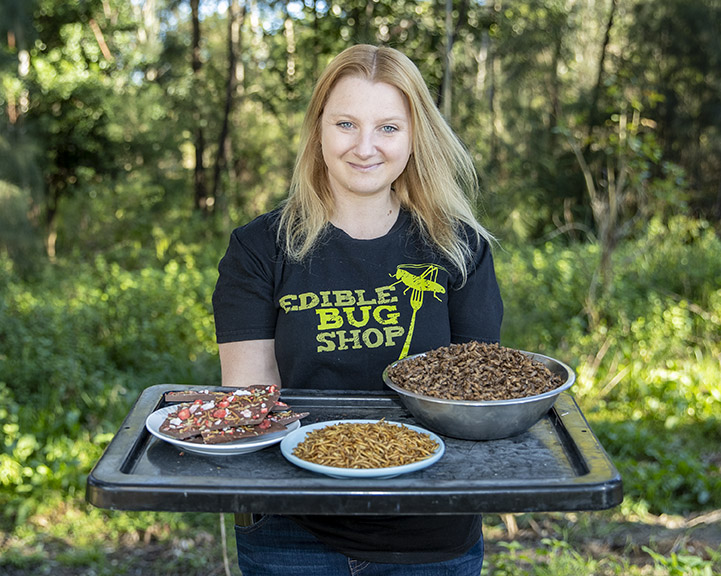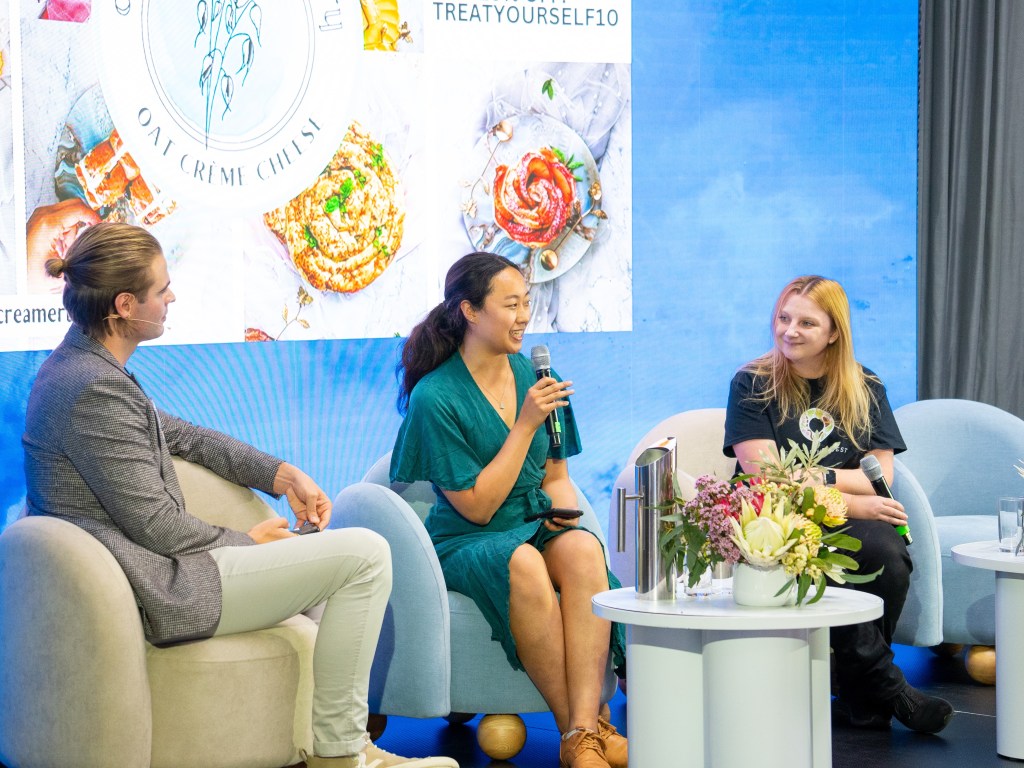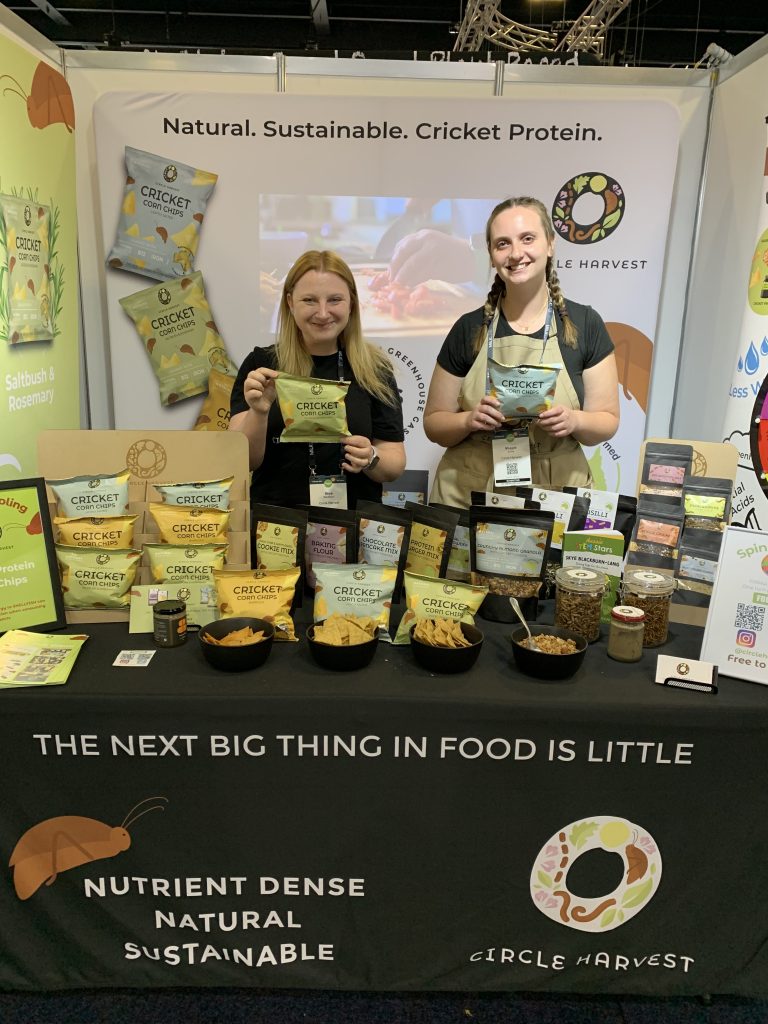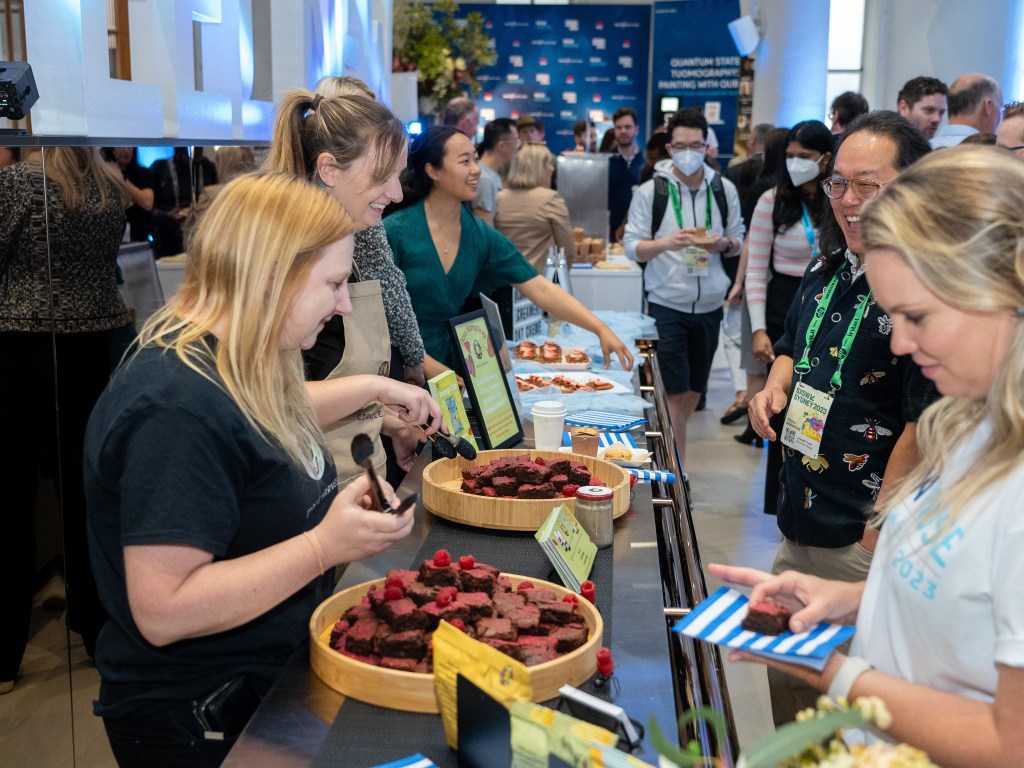Edible insect brands Edible Bug Shop and Circle Harvest are a staple of Australian alt protein events, and founder Skye Blackburn always garners attention for her unique products.
With backgrounds in both entomology and food science, she has made educating consumers of all ages about the benefits of insect protein her mission.
Future Alternative spoke with Blackburn about her journey from entomologist to entrepreneur along with her views on where Australia’s edible insect and insect protein industries are heading.

At what point did your dual backgrounds in entomology and food science begin to intersect, and how did this lead to founding an edible insect brand?
I have always had a fascination with bugs, and from when I was about 4 years old I wanted to be an entomologist. So when I went to uni I studied entomology.
I quickly realised though that there weren’t many job opportunities for a young, inexperienced entomologist, so I decided to complete a degree in food science at the same time. There was a shortage of food scientists at the time and I knew I would be able to get a job straight away.
When I started learning about food science I fell in love with that, too! There is just so much science behind the foods that we eat. I never expected to be able to use both of my skills in one job, or that I would actually make a career out of it.
After uni I was working as a food scientist when I started my own science education company called the BugShop. We would go to schools and teach students about the importance of mini beasts in our environment.
We were looking for a unique promo to do and we had just returned from a visit to Thailand where I tried edible insects for the first time, so I decided to make some lollipops with real insects on the inside.

To complete the retail labels I had to send some crickets and mealworms away for nutritional testing, and when I got the results back I was so amazed that they weren’t commonly used as a source of food here in Australia. It was at that moment that the Edible Bug Shop was born.
I had accidentally acquired the skills to convince people that this is a good idea. I’ve spent the last 16 years educating people about food security and how insect proteins can help be an integral part of our food system, as well as developing the technology behind commercialising insect protein farming for the Australian environment, and even developing food products that use insect proteins as a nutritional ingredient.

How have the edible insect and insect protein markets evolved over the 15 years since you founded your company?
We have definitely seen a huge shift in focus for consumers when it comes to food over the past 16 years. When we first started, consumers weren’t aware that food security could be an issue in the future, and they had definitely not even heard about insect proteins.
Now, when we meet people at events, they are so excited – they have already heard about insect proteins, and they have lots of really great questions and are so enthusiastic to try a food made from insect proteins. Consumers are definitely much more educated about the need for sustainability within our food system.
Was the investment from Mars a game-changing moment for your business and the insect protein industry overall?
In 2019, we were lucky enough to be selected as one of the teams in the Mars Seeds of Change Accelerator program. We received amazing support from all of the staff at Mars and FIAL (Food Innovation Australia) and they really helped us with our branding.
We were never happy with our Edible Bug Shop branding as a retail product for supermarket shelves, and all of our team are scientists, so we didn’t really know where to start to change it. Due to the program we were able to have the amazing team at Clemmengers design a fantastic new brand for us to move forward with.

Our Circle Harvest branding still feels like us, but a more grown up version of us. The positive media we received and having the backing of one of Australia’s largest food brands has definitely been a huge plus for the insect protein industry as a whole.
It really showed that insect proteins are starting to play an important role in our food system, and big food brands are starting to take notice as well.
This isn’t just insects for human consumption. It’s also insects for feed, pet food, waste management and fertiliser too.
How are your products applied in food service, and what is the customer reaction like? Are restaurants required to show which dishes are made with insect protein?
We do supply some of Australia’s best restaurants with edible insects to use in their dishes. Customers are always very excited to try something new and the chefs really concentrate on making the insects the star of the dish. The dishes always look so beautiful.
Insects have the same requirements as any other ingredient you would have in a restaurant, so legally they don’t have to be individually listed. But they are definitely the star of the dish and all of the restaurants that we supply very clearly advertise the insect they are using.
What do you find are the best ways to educate people and children on the benefits of edible insects and insect protein?
We spend a lot of time educating consumers about the benefits of insect proteins and have been running our Future Foods incursions for over 16 years. Providing clear information in language that everyone can understand is the key to the success of our programs.
We also make them very interactive, encouraging questions and discussion as well as taste testing for people that are ready to do that. Having the opportunity to ask questions, as well as experience the taste testing at the same time allows people to overcome any mental barriers.
What was the response to your raspberry cricket brownies like at SXSW Sydney? I heard a large portion of that crowd were not deeply familiar with the alternative protein space.
We had a fantastic response to our brownies at SXSW Sydney and visitors were very eager to taste test them. They were amazed that you could have protein in the form of dessert. We had lots of people coming back for seconds and taking some home for their kids to try.


What do you think about the growing trend of using insect robots to convert food waste into additives for feed and fertiliser?
I think this is absolutely fantastic and a much needed service for our community. There is no need for food waste to be sent to landfill to rot. Especially when we have innovative services like this that can upcycle the food waste and turn it into a usable and valuable product.
I personally have pretty severe insectophobia. What’s your personal relationship with insects like?
I have always been interested in creepy crawly things and think they are so interesting. They all look different, live in different environments, and have different behaviours, just like real life Pokemon. Why wouldn’t you want to learn more about them?
To stay up-to-date on the latest industry headlines, sign up to Future Alternative’s enewsletter.
Posted on:


